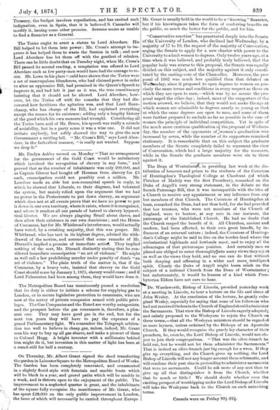"Conservative reaction" has penetrated deeply into the Senate of the
University of London, who declined last Wednesday, by a majority of 17 to 10, the request of the majority of Convocation, urging the Senate to apply for a new charter with power to the University to admit women to degrees. Only twelve years ago, at a time when it was believed, and probably truly believed, that the popular body was averse to this proposal, the Senate was equally divided on this subject, and the majority against it only consti- tuted by the casting-vote of the Chancellor. Moreover, the pro- posal of 1862 was much less qualified than that debated on Wechsesday, since it proposed to open degrees to women on pre- cisely the same terms and conditions in every respect as those on which they are open to men,—which was by no means the pro- posal urged the other day ; indeed, most of the supporters of the motion avowed, we believe, that they would not make the age at which women are admissible to degrees nearly so young as that at which the same degrees are open to men, and some of -them were further prepared to exclude as far as possible in the case of women the principle of individual competition. Yet in spite of the much more cautious qualification of the proposal of Wednes- day, the number of the opponents of.'women's graduation was increased by seven, while the number of its supporters remained stationary. It is remarkable that on this subject the graduate members of the Senate completely failed to represent the view of Convocation, which had a large majority for the measure, while in the Senate the graduate members were six to three against it.


































 Previous page
Previous page